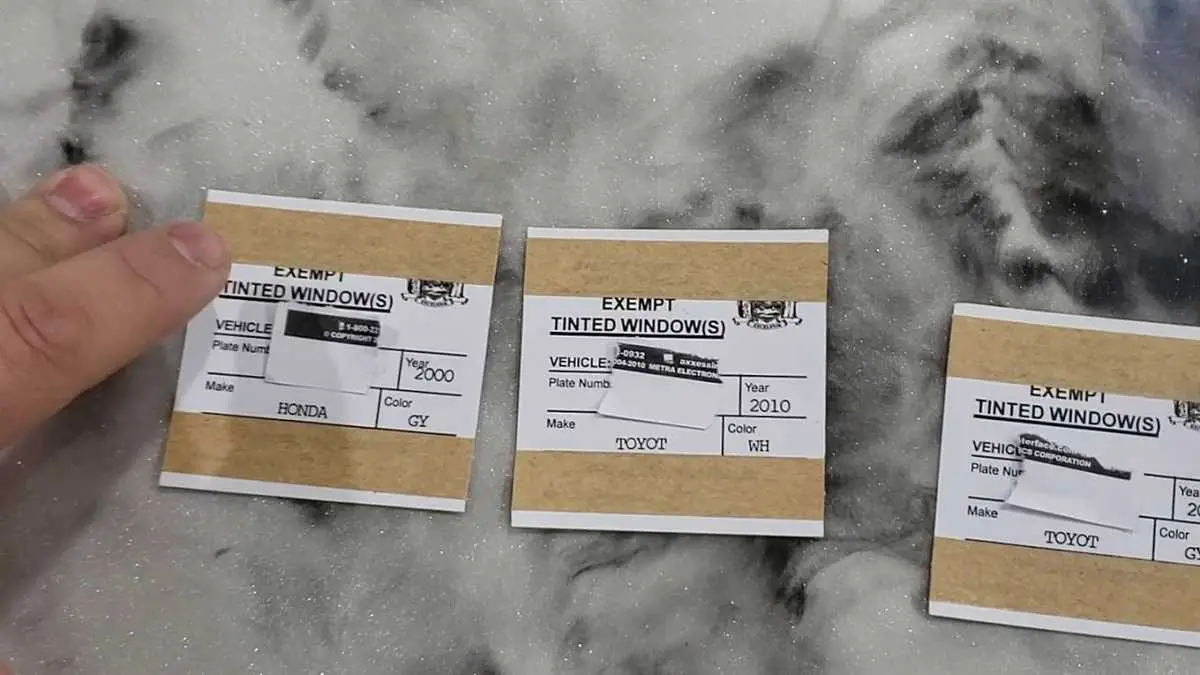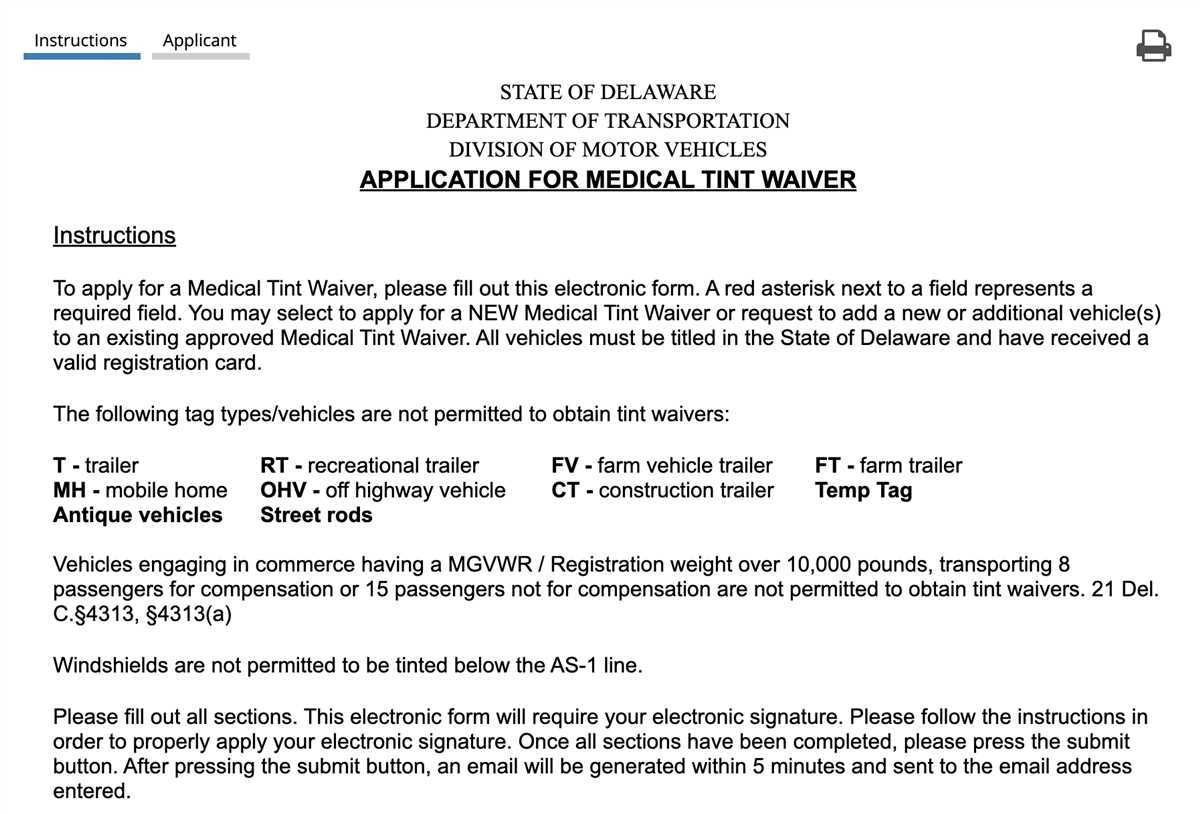Last Updated on January 30, 2024 by Vadym

A window tint exemption is a special allowance or permission granted by the government that allows certain vehicles to have darker window tints than what is typically permitted by law. In many countries and states, there are regulations and laws in place that limit the amount of tint that can be applied to vehicle windows for safety reasons. These laws are usually in place to ensure that drivers have clear visibility both during the day and at night. However, some vehicles may qualify for an exemption to these laws, allowing them to have darker window tints.
Window tint exemptions are often granted for specific reasons or purposes. One common reason for granting an exemption is for medical purposes. Individuals with certain medical conditions may require a darker window tint to protect their eyes from sunlight or bright lights. This could include individuals with light sensitivity, those who have had eye surgery, or individuals with specific skin conditions that make them highly sensitive to sunlight.
Other vehicles that may qualify for a window tint exemption include law enforcement vehicles, security vehicles, and diplomatic vehicles. These types of vehicles often require darker window tints for security and safety purposes. Law enforcement vehicles, for example, may have tinted windows to protect officers and suspects during traffic stops or to keep equipment hidden from view. Diplomatic vehicles may also have darker tints to protect the privacy of diplomats or government officials.
In order to obtain a window tint exemption, vehicle owners or drivers must typically apply for the exemption and provide documentation to support their request. This documentation could include medical certificates, vehicle registration information, or proof of employment in a profession where a tinted vehicle is necessary. It is important to note that the specific requirements and regulations for obtaining a window tint exemption can vary depending on the country or state.
Understanding Window Tint

Window tint refers to the film that is applied to the windows of a vehicle to reduce the amount of visible light and heat that enters the vehicle’s interior. It can also provide added privacy and protection from harmful UV rays.
When the window tint film is applied to the glass, it is typically made from a polyester film that is coated with a thin layer of metal or ceramic particles. This coating is what helps to block or reduce the amount of light and heat that can pass through the glass.
Window tint film can come in different levels of darkness, typically denoted by the percentage of visible light transmission (VLT) that is allowed to pass through the film. The lower the percentage, the darker the tint. For example, a film with a VLT rating of 30% means that only 30% of visible light is allowed to pass through the film, while the remaining 70% is blocked or reflected.
In many jurisdictions, there are regulations and laws regarding the darkness of window tint that is allowed on vehicles. These laws vary by location and typically specify the maximum VLT percentage that is allowed. Violating these laws can result in fines and penalties.
However, there are certain circumstances where individuals may be exempt from these window tint regulations. This is often the case for individuals with certain medical conditions or light-sensitive disorders that require additional protection from the sun’s rays. To qualify for a window tint exemption, individuals usually need to provide documentation from a medical professional supporting their need for tinted windows.
Understanding window tint and its regulations is important for vehicle owners to ensure that they are in compliance with the law and to make informed decisions about their tinting needs. It is advisable to check the specific regulations in your local area to determine the permissible limits for window tint on vehicles.
The Importance of a Window Tint Exemption
Window tinting is a popular choice for many vehicle owners. It offers a variety of benefits, including enhanced privacy, protection from harmful UV rays, and improved temperature control inside the vehicle. However, in many places, there are laws and regulations in place that restrict the level of tint allowed on car windows.
However, having a window tint exemption is crucial for certain individuals or industries. For instance, law enforcement officers often require a darker tint on their vehicles for safety and security purposes. It provides them with the ability to remain discreet and less visible to potential threats, allowing them to carry out their duties more effectively.
Similarly, individuals with medical conditions may require specific levels of window tint to protect against the harmful effects of sunlight. Conditions like photosensitivity or certain skin disorders can make it essential to have a window tint exemption to ensure their well-being and avoid potential health complications.
Additionally, some occupations may benefit from a window tint exemption for practical reasons. Delivery drivers who transport sensitive or valuable goods may need a darker tint on their vehicle windows to hide the contents and reduce the risk of theft or vandalism.
Moreover, a window tint exemption can also be crucial for individuals living in areas with extreme climates. Window tinting helps to regulate the internal temperature of a vehicle, reducing the need for excessive use of air conditioning or heating systems. This, in turn, can improve fuel efficiency and reduce greenhouse gas emissions.
It is important to note that obtaining a window tint exemption requires proper documentation and adherence to specific guidelines set forth by the local authorities. The regulations vary from region to region, so it is essential to research and understand the specific requirements in your area.
In conclusion, a window tint exemption holds significant importance for various individuals and industries. It allows for enhanced privacy, protection against UV rays, and improved temperature control. Whether for safety, health, or practical reasons, having a window tint exemption can make a substantial difference in certain situations and ensure compliance with the law.
Different Window Tint Laws
Window tint laws vary from state to state, and it’s important to understand the specific regulations in your area. The level of allowed tint depends on the percentage of light that can pass through the window film. These laws are typically in place to ensure driver visibility and prioritize safety on the road.
In some states, there are strict guidelines for the maximum tint darkness. For example, in California, the front side windows must allow more than 70% of light to pass through, while the rear side windows and back window can have any darkness level. However, front windshield tinting is only allowed on the top 4 inches.
In other states, there are regulations based on the Visible Light Transmission (VLT) percentage. VLT refers to the amount of visible light that can pass through both the window glass and tint film. For instance, in Florida, vehicles are required to have a VLT of at least 28% on the front side windows, while the rear side windows and back window can have any darkness level.
It’s important to note that these laws are subject to change, and it’s crucial to stay updated on the current regulations. Violating window tint laws can result in fines and penalties, including getting pulled over by law enforcement and having to remove the tinted film.
If you’re unsure about the window tint laws in your state, consult with your local Department of Motor Vehicles or a professional window tint installer for accurate and up-to-date information.
Obtaining a Window Tint Exemption
If you believe you qualify for a window tint exemption, you will need to follow certain steps to obtain one. The exact process can vary depending on your location, so it is important to check with your local department of motor vehicles or law enforcement agency to understand the specific requirements and procedures.
First, you will generally need to gather the necessary documentation to support your exemption request. This may include medical or disability records, such as a doctor’s note or prescription, that demonstrate a valid medical need for tinted windows.
Once you have the required documentation, you will likely need to complete an application form, which may be available online or at your local DMV office. This form will typically require information about your vehicle, such as the make, model, and license plate number, as well as your personal information.
After completing the application, you may need to submit it along with the supporting documentation to the appropriate authority. This could be the DMV, law enforcement agency, or another designated office. It is important to follow any instructions provided and ensure that all required materials are included.
The authority will then review your application and supporting documentation to determine if you qualify for a window tint exemption. This process may take some time, so it is important to be patient and follow up if necessary.
If your exemption request is approved, you may be issued a certificate or permit that allows you to legally have tinted windows. It is important to keep this document easily accessible in your vehicle, as you may be required to present it to law enforcement officers or other officials when asked about your window tint.
Remember, obtaining a window tint exemption is not guaranteed, and the specific requirements can vary. It is essential to familiarize yourself with your local laws and regulations to ensure compliance and avoid any potential penalties for illegal tinting.
Disclaimer: The information provided here is for general informational purposes only and should not be construed as legal advice. If you have specific questions or concerns about window tint exemptions, it is recommended that you consult with a qualified legal professional or your local authorities.
Benefits of a Window Tint Exemption
A window tint exemption can offer several advantages to vehicle owners. Here are some of the significant benefits:
1. Enhanced Privacy: One of the main advantages of having a window tint exemption is the increased privacy it provides. The tinted windows prevent outsiders from peering into your vehicle, protecting your personal belongings and adding an extra layer of security.
2. Heat Reduction: Window tinting helps to regulate the temperature inside the vehicle by reducing the amount of heat that enters. This can be especially beneficial during hot summer months, as it keeps the interior cooler and prevents the need for excessive air conditioning, thus saving fuel and energy.
3. UV Protection: Window tinting blocks harmful ultraviolet (UV) rays from the sun, which can cause skin damage and fade the interior of your vehicle. With a tint exemption, you can enjoy sun protection for both yourself and your car’s interior, prolonging its longevity and reducing the risk of skin-related issues for occupants.
4. Glare Reduction: Tinted windows significantly reduce glare from the sun, making it easier and safer to drive, especially during bright and sunny conditions. By minimizing glare, you can have better visibility and reduce eye strain, making your driving experience more comfortable and enjoyable.
5. Improved Safety: Window tinting can enhance the safety of your vehicle by reinforcing the glass. In the event of an accident, the tinted film can prevent glass shards from scattering, reducing the risk of injuries caused by broken glass. It also adds an additional layer of protection against break-ins and thefts.
6. Interior Preservation: The sun’s UV rays and excessive heat can cause damage to your vehicle’s interior, leading to fading, cracking, or warping of materials. By having a window tint exemption, you can shield your car’s interior from such harmful effects, maintaining its aesthetics and overall value.
7. Energy Efficiency: With a window tint exemption, you can reduce your vehicle’s energy consumption by relying less on air conditioning during hot weather. This can lead to fuel savings and minimize your carbon footprint, contributing to a more sustainable and eco-friendly driving experience.
Overall, a window tint exemption provides numerous benefits, ranging from privacy and comfort to safety and energy efficiency. However, it’s important to check and comply with local regulations regarding window tint darkness levels to ensure you have a legal and properly installed tint on your vehicle.
